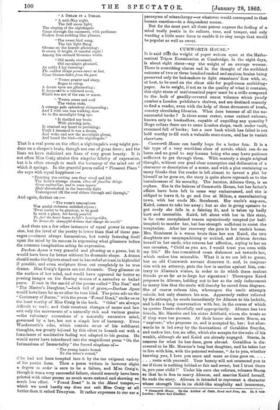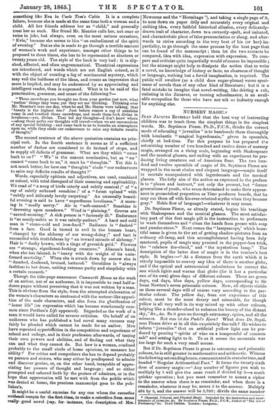CUMWORTH . HOUSE.*
IT is said tat the weight of paper written upon at the Mathe- matical Tripos Examination at Cambridge, in the eight days, is about eight stone—say the weight of an average woman. There is something almost sad in the thought of the scribbled
outcome of two or three hundred racked and anxious brains being preserved only for bed-makers to light examiners' fires with, or, at best, to be used on the clean side for pupil-room scribbling- paper. As to weight, if not as to the quality of what it contains, this eight stone of mathematical paper must be a trifle compared to the bulk of gaudily-covered uncut volumes which yearly cumber a London publisher's shelves, and are destined scarcely to find a reader, even with the help of those devourers of trash, country circulating libraries. What does become of all the un- successful books ? Is there some crater, some extinct volcano, known only to booksellers, capable of engulfing any quantity ? Huge cellars there are to some London shops, vault under vault, crammed full of books ; but a new book which has failed is not held worthy to fill such a valuable store-room, and has to vanish elsewhere.
Cumworth. House can hardly hope for a better fate. It is a fair type of a very worthless class of novels, which can do no harm and no good to any human being who may have patience sufficient to get through them. With scarcely a single original thought, without one good clear conception and delineation of a character or description of a scene, and with a plot containing so many blanks that the reader is left almost to invent a plot for himself as he goes on, the story is quite above reproach as to the harmlessness of its morality. The heroine, Alisoun Grey, is an orphan. She is the heiress of Cumworth House, but her father's affairs have been left in some way embarrassed, and she is obliged to leave it, to go and live at Milton, a manufacturing town, with her uncle Mr. Stonhurat. Her uncle's step-son, Kaird, comes to take her away ; but as she is going upstairs to get ready she falls in a fainting fit, and is taken up badly hurt and insensible. Kaird, left alone with her in this state, is for some unexplained reason mysteriously tempted (or half- tempted) to murder her, but has strength sufficient to resist the temptation. After her recovery she goes to her uncle's house. Mrs. Stonhurst is a worse brute than her son Kaird, the two daughters are unsympathizing or unkind, and Alisoun devotes herself to her uncle, who returns her affection, saying to her on one occasion, "Child as you are, I would trust you even with my life." He- has committed some dishonest act towards her, which makes him miserable. What it is we are left to guess, but an old Cumworth servant discovers it, and, in conjunc- tion with an attorney, puts the law in motion against him, con- trary to Alisoun's wishes, in order to do which these zealous friends go so far as to forge her signature I Thereupon Kaird proposes to Alisoun, bolding out to her as the only inducement to marry him that the uncle will thereby be saved from disgrace. She of course refuses him, whereupon the uncle attempts suicide, but only shatters- his arm. Apparently rather relieved by the attempt, he sends immediately for Alisoun to his bedside, and holds a long conversation with her, in the course of which he quotes Dante cheerfully and appropriately. Alisoun has two friends, Mr. Maurice and his sister Adelheid, whom she treats as if they were her parents. At their house she meets Sturm, an "explorer," who proposes to, and is accepted by, her; but after- wards he is led away by the fascinations of Geraldine Smythe, and makes her, too, an offer, which she accepts for the sake of his wealth, although she and Kaird are already engaged. Sturm, in remorse for what he has done, goes abroad. Geraldine is dis- covered to be Mr. Maurice's long lost daughter, and he takes her to live with him, with the paternal welcome, " As to you, whether knowing you, .I love you more and more as time goes on. . . . . . . rests with yourself. Your beauty will not commend you to- me if there is nothing behind so fair and sweet, but I trust there is, you poor child !" Under his care she reforms, releases Sturm so that he is free to marry Alisoun, and marries Kaird herself. So ends the story. Alisoun is intended to represent a character whose strength lies in its child-like simplicity and innocence,
• Cumwevelk Hoarse. By-the Author of Cake, Borai.and Free, &a In-S voce London : Hand and Blackett.
something like Eva in Uncle Tom's Cabin It is a complete failure, because she is made at the same time both a woman and a child. All her friends address her as " child," and generally treat her as such. Her friend Mr. Maurice calls her, not once or twice in joke, but always, even on the most serious occasions, " Evie," because she seems to him " an embodiment of the spirit of evening." But as she is made to go through a terrible amount of woman's work and experience, amongst other things to be proposed to three times, she has to be represented as nineteen or twenty years old. The style of the book is very bad ; it is slip- shod, affected, and often ungrammatical. Theatrical expressions are introduced, and words which are not English coined, as if with the object of creating a fog of sentimental mystery, which may veil the baldness of the ideas, and create an impression that more is implied, and may be understood by an appreciating and intelligent reader, than is expressed. What is to be said of the punctuation, grammar, and sense of the following?—
"Those snowdrops you brought me from your garden just now, what useless' things they were, yet they set me thinking. Thinking over Mr. Maurice's text one day, when he and Mr. Sturm were talking, that 'beauty is the highest use!' Just before sunset a ray of sunshine came in and touched those snowdrops, and made them look divine in loveliness—yes, divine. That led my thoughts—I don't know where —along those paths our thoughts will travel—when we are unconscious of any special thinking — and come back to us to breathe an atmosphere upon us, while they elude our endeavours to seize any definite results of thought."
The second sentence of the above quotation contains no prin- cipal verb. In the fourth sentence it seems as if a sufficient number of dashes are considered to do instead of stops, and to supply all defects of grammar. What are they which " come back to us ?" " We " is the nearest nominative, but as "we " cannot " come back to us," it must be " thoughts." Yet this is not much better, for how can " thoughts" elude " our endeavours to seize any definite results of thought ?"
Words, especially epithets and adjectives, are used, combined or coined, with total disregard of their meaning and applicability.
We read of " a song of birds utterly and subtly musical ;" of " a ray of subtly softened sunshine ;" of a " forest upland " with "subtly and delicately lovely carpeting." An unusually beauti- ful evening is said to have " superfluous loveliness." A morn- ing' is " madly merry." Air is " soft-sunned." Sunshine is " drowsing upon meadows." Wind 'is plaining." Groves are "sacred-seeming." A sick person is "furiously ill." Endurance is "as manly-noble as it was saintly-patient." A hard and cold man is " stone-cold and iron-hard." Radiance is " dashed" from a face. Good is turned to evil in the human heart, "changed by the alchemy of our wrong-doing ;" and tact is reconciled with truthfulness by " an inward miracle of alchemy." Hair is " dusky brown, with a tinge of greenish gold." Flowers are " strange, significant-looking creatures." Alisoun's hand, when she has fainted, is " heavy with the weight of its unin- formed mortality." When she is struck down by sorrow she is " dumbed, deafened, bruised, battered." Geraldine is " always faultless in her dress, uniting extreme purity and simplicity with a certain research."
Though the title-page announces Cumworth House as the work of an author, not of an authoress, it ie impossible to read half-a- dozen pages without perceiving that it was not written by a man. This is obvious from the style, from the attempted elaboration of the women's characters as contrasted with the meteor-like appari- tion of the male characters, and also from the glorification of "inner life" (an expression which has become wearisomely com-
mon since Perthes's Life appeared). Regarded as the work of a man it would have called for severer criticism. On behalf of an authoress who has published a bad novel many excuses may fairly be pleaded which cannot be made for an author. Men have repeated opportitities in the competition and experience of
school and college, and in their profession afterwards, of testing their own powers and abilities, and of finding out what they can and what they cannot do. But how is a woman, confined probably to the small circle of home opinions, to measure her ability? For critics and competitors she has to depend probably on parents and sisters, who may either be predisposed to admire and discover genius, or, on the other hand, incapable of appre- ciating her powers of thought and language ; and so either prompted and ushered forth by the praises of admirers, or in the hope that appreciation will be met with from the public which was denied at home, the precious manuscript goes to the pub- lisher's.
It might be a useful exercise for any one whom the cacoethes scrib' midi tempts for the first time, to make a selection from some really good novel (say, for instance, the description of Mrs.
Newcome and the " Hermitage "), and taking a single page of it, to note down on paper drily and accurately every original and striking idea, every faithful historical allusion, every delicately- drawn trait of character, down to a correctly-spelt, and imitated, and characteristic piece of false pronunciation or slang, and after- wards to strive according to the very best of his (or her) im- partiality, to go through the same process by the best page that can be found of the manuscript ; then let the two extracts be compared, idea with idea, expression with expression. To com- pare and criticize quite impartially would of course be impossible ; but the attempt might help to dissipate the notion that to write a novel, no knowledge of history or facts, no clearness of thought or language, nothing but a fervid imagination, is required. The public will swallow (as a child does sugar-plums) worse speci- mens of novels than of any other kind of literature ; but it is a fatal mistake to imagine that novel-writing, like driving a cab, enlisting in the Zouaves, or turning schoolmaster, is an avail- able occupation for those who have not wit or industry enough for anything else.

































 Previous page
Previous page